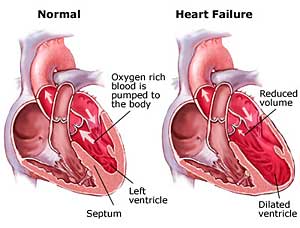Heart failure - symptoms and treatment

Heart Failure Definition
Heart Failure - The inability of the HEART to adequately pump BLOOD. Heart failure may affect the right heart (pulmonary circulation), left heart (body circulation), or total heart. Heart failure, occasionally called by its antiquated name dropsy, is a consequence of longstanding CARDIOVASCULAR DISEASE (CVD) that has damaged the structure of the heart. About 5 million Americans live with heart failure.
| CONDITIONS THAT CAN CAUSE HEART FAILURE | |
|---|---|
| ATHEROSCLEROSIS | CARDIOMYOPATHY |
| certain arrhythmias | CONGENITAL HEART DISEASE |
| CORONARY ARTERY DISEASE (CAD) | HEART ATTACK |
| HYPERTENSION (high BLOOD PRESSURE) | long-term ALCOHOL abuse |
| PRIMARY PULMONARY HYPERTENSION | VALVULAR HEART DISEASE |
Symptoms of Heart Failure and Diagnosis
The key symptoms of heart failure are shortness of breath (DYSPNEA) and fluid retention (edema). Because symptoms come on gradually as the heart failure progresses, many people are unaware of them until they notice fatigue, weakness with exertion, rapid or unexplained weight gain, and frequent URINATION. Right heart failure tends to produce peripheral edema (swelling of the lower legs, ankles, and feet). Left heart failure tends to produce central edema (fluid accumulation in the LUNGS), also known as congestive heart failure. Progressive heart failure generally affects the total heart, though right or left failure may be dominant. The diagnostic path typically includes chest X-RAY, which shows fluid accumulation in the lungs and enlargement of the heart, as well as ELECTROCARDIOGRAM (ECG) to assess the heart’s electrical activity. Heart failure often causes ARRHYTHMIA. ECHOCARDIOGRAM shows the heart’s function and size.
Heart Failure Treatment Options and Outlook
Treatment targets any causative cardiovascular conditions, such as CORONARY ARTERY DISEASE (CAD) and HYPERTENSION. Surgery may correct valve dysfunctions or previously undetected congenital abnormalities such as septal defect. Medications can effectively manage heart failure for many years, allowing people to work and enjoy recreational activities. However, as heart failure progresses, it imposes greater restrictions on physical activity. People who have end-stage heart failure may benefit from a ventricular assist device (VAD), a mechanical pump implanted in the chest cavity that aids the heart in pumping blood. This allows the heart to rest and sometimes to recuperate. The VAD also can serve as a bridge to HEART TRANSPLANTATION, another treatment option for end-stage heart failure.
| MEDICATIONS TO TREAT HEART FAILURE | ||
|---|---|---|
| Medication Type | Representative Medications | Effects |
| angiotensin II receptor inhibitors | losartan, valsartan, telmisartan | dilate arteries; lower BLOOD PRESSURE |
| angiotensin-converting enzyme (ACE) inhibitors | captopril, enalapril, ramipril, benazepril, monopril | dilate arteries; lower blood pressure; slow progression of HEART FAILURE |
| anticoagulants | warfarin, heparin, aspirin | reduce blood’s tendency to clot |
| beta blockers | carvedilol, metoprolol, propranolol, sotalol, timolol | regulate HEART RATE |
| calcium channel blockers | amlodipine | dilate arteries; lower blood pressure |
| diuretics | hydrochlorothiazide, furosemide, bumetanide, metolazone | reduce fluid accumulations (edema) |
| inotropics | digoxin, digitoxin | strengthen heart MUSCLE; decrease heart’s workload |
| vasodilators | nitroglycerin, isosorbide, hydralazine, minoxidil | relax and open blood vessels |
Risk Factors and Preventive Measures
Underlying cardiovascular conditions are the most important risk factors for heart failure, particularly those that are undiagnosed or poorly managed (notably hypertension and CAD). Lifestyle measures to prevent cardiovascular disease, such as daily physical exercise and not smoking, reduce the likelihood of heart failure as well. CARDIAC REHABILITATION following heart attack can restore heart function to the extent possible. Other preventive measures include careful management of conditions such as DIABETES and OBESITY (including WEIGHT LOSS AND WEIGHT MANAGEMENT) that can lead to cardiovascular disease.
See also CARDIOVASCULAR DISEASE PREVENTION; MEDICATIONS TO TREAT CARDIOVASCULAR DISEASE; PHYSICAL EXERCISE AND CARDIOVASCULAR HEALTH; VENTRICULAR ASSIST DEVICES (VADS).